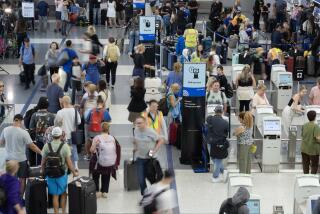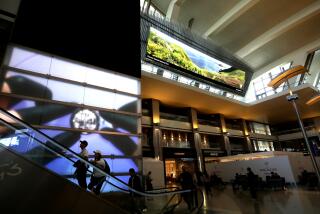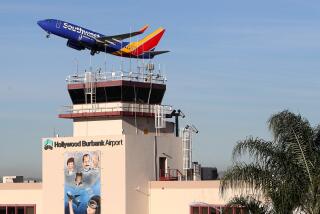A Day of Clear Skies
- Share via
With a dozen minutes to spare, Joe Kefauver settles into his seat and dives into a crossword puzzle as his Atlanta-bound flight prepares to pull away from the gate at Orlando International Airport.
He pays little heed to his aisle mates, a trio of junior high cheerleaders giggling over a deck of Mickey Mouse cards. Like many Orlando-based business travelers, Kefauver is oblivious to the din of tourists heading home from Disney World vacations.
“I have a small child. It doesn’t bother me in the slightest,” he says.
At least one thing hasn’t changed in the wake of Sept. 11: Flights out of Orlando still feature the sounds of children laughing, screaming and crying.
What has changed is how long it takes Kefauver, a lobbyist for Darden Restaurants, whose holdings include the Olive Garden and Red Lobster chains, to get to his seat.
Before Sept. 11, Kefauver, 35, would have given himself a little more than an hour to get to the airport--16 miles from his downtown-area home--and onto his flight. But new security measures have translated into another hour added to his pre-boarding schedule.
For this trip--an overnight jaunt for a series of meetings in Atlanta--the morning starts easy enough.
The 11:30 a.m. flight affords Kefauver the luxury of a few extra minutes at home with his 3-year-old daughter and Newman, the family’s feisty 7-month-old pug.
At 9:25 a.m., Kefauver sets out for the airport armed with a light carry-on and his briefcase, which includes space for his laptop, Palm Pilot and cell phone--any of which could add delays at the screening checkpoint.
Taking a roundabout route--longer but with fewer delays--he cruises onto the airport grounds 23 minutes later and begins to search for a space in one of the two parking towers that flank Orlando International.
Demonstrating the savvy of a frequent flier, Kefauver heads for the garage opposite the Delta Air Lines ticket counters. The theory is simple: Delta is the airport’s busiest carrier, so why fight with everyone else for the closest spaces?
“I do it as a way to stay away from the Delta mess,” he says. “It adds a 100-yard walk, but it’s easier to find a space.”
Car safely stowed--and with its location recorded on his Palm Pilot--Kefauver grabs his bags and heads for the terminal elevators.
Pausing as he leaves the elevator, he pats the vest pocket of his jacket, confirming that his wallet is where it should be. It’s 9:59 a.m., a bit more than 90 minutes before scheduled takeoff.
That’s when his thus-far smooth trip hits a snag.
As he scans the “departures” monitor for his flight, Kefauver, who bought an electronic ticket, realizes he neglected to bring a copy of his printed itinerary. Six months ago, this would mean nothing. But these days, only passengers are allowed anywhere near a gate. And passengers need a piece of paper to prove it.
So with a glance toward the stern-faced screener blocking access to the security checkpoint and the gates beyond, Kefauver takes a deep breath, grabs his bags and weaves his way toward the Delta ticket counters.
At 10:03 a.m., Kefauver slides into line behind dozens of tourists and other business travelers, just as his lobbyist partner and traveling companion, Shannon McAleavey, enters the terminal.
“What’s the pileup here?” McAleavey asks, offering a sympathetic smile and a promise to grab a couple of seats at the gate.
But even as the line trudges forward, Kefauver remains in good spirits, using the time to place a few calls on his cell phone and make notes in his Palm Pilot.
Looking down the span of more than two dozen ticket counters, Kefauver sees little to complain about--virtually every position is manned by a Delta worker.
“That tells me they are doing everything they can,” he says.
Nineteen minutes later, Kefauver is on his way back to the security checkpoint, with ticket in hand. Getting through is fairly smooth, although Kefauver does attract the attention of a screener, who asks politely if he wouldn’t mind being searched a little more thoroughly.
Post-Sept. 11, this is not unusual.
He appreciates the extra attention paid to passengers. He does, however, see inconsistencies in how thoroughly workers do their jobs and wonders why he is selected for a search three of every four times he passes through security.
“I either look completely guilty or like someone who won’t give them grief if they ask me,” Kefauver says.
Having passed security, he has just enough time to grab a muffin before rushing to catch up with McAleavey at the gate with a few minutes to go before boarding begins. That’s cutting it a bit closer than he likes; he typically arrives with at least half an hour to spare.
“That way,” he says, “if your flight gets canceled, you have time to make adjustments.”
Minutes later, Kefauver folds himself into that seat across from the cheerleaders and, after making quick work of the crossword puzzle, plans the rest of his day.
During the short hop to Atlanta, Kefauver rifles through a stack of notes, working up a list of calls he plans to make from the rental car. The plane touches down shortly after 1 p.m.
Although Kefauver considers Atlanta’s Hartsfield Airport to be the worst in the country--in terms of congestion and delays--he and McAleavey are out and stepping into their rental car at 1:34 p.m., 18 minutes after exiting the airplane.
On this day free of major glitches, fortune smiles upon the pair as they pull out of Hartsfield and onto Atlanta’s much-maligned highways.
“At any given time of day, it can be a parking lot,” he says. “The place just grinds to a halt.”
But today it takes only 33 minutes to cover the 35 miles between the airport and the Darden regional office in Alpharetta, north of downtown Atlanta.
When all is said and done, the biggest change that Sept. 11 has wrought upon Kefauver’s business travels is that it simply takes longer to go from here to there.
But he doesn’t begrudge that extra time spent milling about the airport.
For Kefauver, who travels at least twice a month, the terrorism that changed the way people fly is only little more than an inconvenience.
“I’ve got a cell phone. I’ve got high-speed jacks. I’ve got pay phones,” he says. “Obviously, I can get more done at the office, but this isn’t a waste of time.”
*
(BEGIN TEXT OF INFOBOX)
Orlando to Atlanta
Joe Kefauver
Age: 35
Title: Restaurant lobbyist
Years on the road: 6
Annual trips pre-9/11: 35
Annual trips post-9/11: No change
*
Airport Report Card
Best
Orlando: “Very efficient. Getting from the curb to the gate is usually an easy trip.”
Worst
Atlanta: “It’s so big. And it’s so congested.” And during the summer months, when afternoon thunderstorms wreak further havoc, “you can just about count on being delayed.”
More to Read
Sign up for The Wild
We’ll help you find the best places to hike, bike and run, as well as the perfect silent spots for meditation and yoga.
You may occasionally receive promotional content from the Los Angeles Times.






